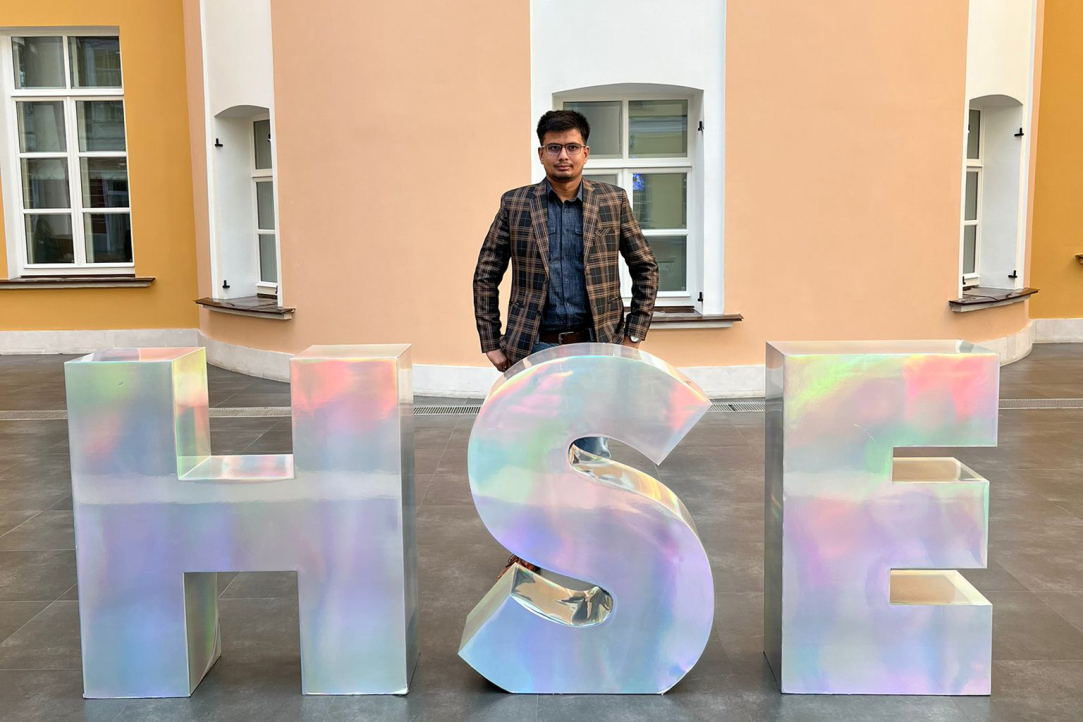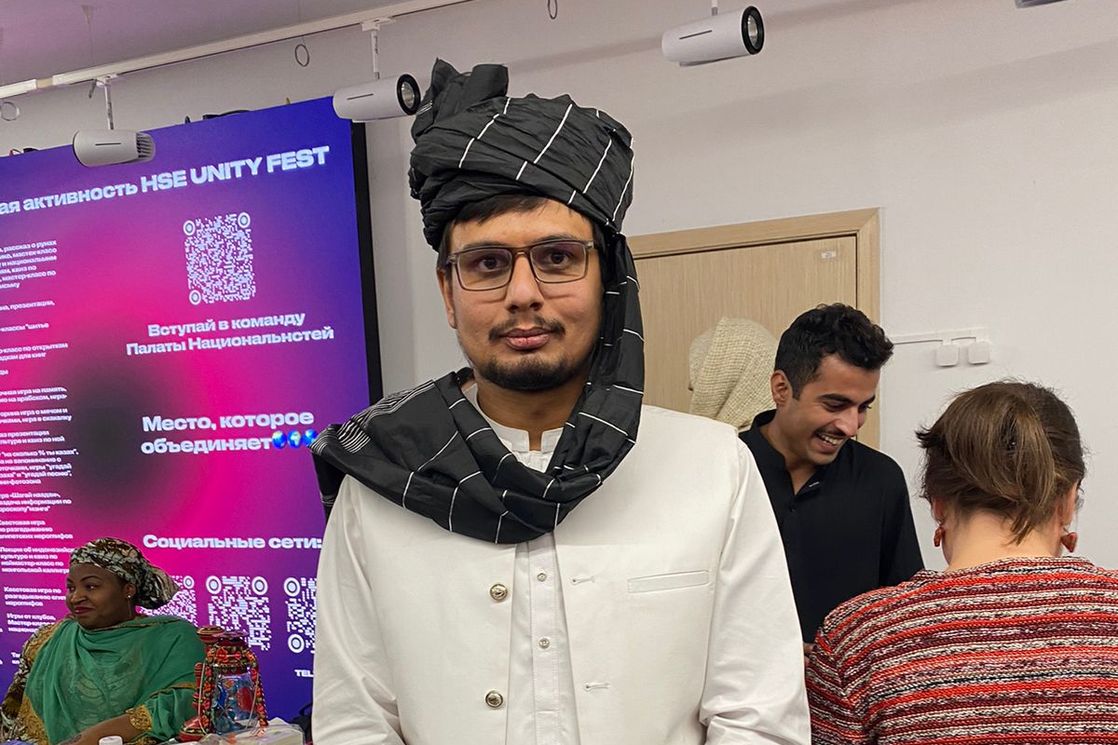‘The Problems Are the Same Everywhere. If You Want to Bring Changes, You Have to Do It Collectively’

Kafayat Ali, from the city of Depalpur in Pakistan, is a graduate of Lahore Leads University and a current student of the HSE Preparatory Year programme. In September, he will begin his studies on the Master’s in Critical Media Studies at HSE University-Moscow. In this interview, Kafayat explains how he helps others discover HSE University, how the Prep Year programme prepares students for their time in Russia, and why studying a country’s social issues can help people all over the world.
— How did you hear about HSE University?
— In this age of social media, it is not difficult to find out about good departments or institutes to study at. When I was applying for a scholarship, I was very cautious about my choice of university. After I won the Open Doors scholarship, I decided to join HSE University in Moscow because of its reputation and the standard of education.
— How did the application process go?
— The admission process was long for me because I first applied to the Open Doors competition and then I won that scholarship. Then I just sent the documents to HSE University for admission.
Almost everyone on the admissions staff knows English very well. They can speak and they can listen. This is a good thing for communicating with international students
I have never had any difficulties communicating with admission committee staff or my teachers. Everyone is polite and good at getting back to you by email.
— After four months in Moscow, what are your impressions?
— I am living in the dorm at Vykhino—it is an amazing location. There is not much noise, and there is a park behind the dormitory where we go for a walk.
In terms of facilities, it is like living at home. We have a refrigerator, bedding, a room, a kitchen, and good washrooms and toilets. We don’t have to pay anything to the university or the dormitory management. I’m very happy with it.

Everything in Moscow is beautiful. Taganskaya, for example, is in the heart of the city and has little lights shining in the street. I was surprised and happy to find a Pakistani restaurant there!
You can live a good life here. There are a lot of job opportunities, and you can even work while you study (if you are not a student of the Preparatory Year). Many of my student friends have jobs here
— What’s the hardest thing about living in Moscow?
— Snow! Winter. I haven’t got used to the weather yet.
— You have a video blog. What have you covered in it so far?
— I tell future students about admission to HSE via the Open Doors scholarship. I tell them about coming to Russia without any cost. I want as many Pakistani students as possible to come here because I think the educational quality at HSE is much better than at many other universities. I motivate young people from Pakistan to apply to HSE, and hopefully some will be here by next year.
I am part of the HSE family. And when you are a member of any family, the family should be your priority
— Do you want to be a social media researcher or a blogger in the future?
— I want to be an analyst and a good researcher. If you are just speaking without understanding what is wrong in society, what effect your field has in society, and without doing anything for people, I think it is a waste of time. You are not being sincere with yourself or with others.
I want to investigate and try to solve some social issues, especially in underdeveloped countries where there is too much polarisation. My research target will be my own country. I know its problems. Over time, we should focus on the whole world because we are living in a global village. The problems are the same everywhere, and if you want to bring changes, you have to do it collectively. Hopefully, Pakistan will be the first point I start from.
— What are your preparatory courses like?
— I am only learning the Russian language at the moment. It is not impossible, but it’s definitely difficult, especially when you have to change words to describe different actions. I always try to speak Russian when I go shopping.
My Russian classes are on Pokrovsky Boulevard. We have classes five days a week.
We have the same kind of facilities as any other HSE students, even though we are still on the preparatory course
There are 12 students in our class. There are people from Nigeria, Ghana, Uganda, Pakistan, Bangladesh, the Philippines, Turkey, and Morocco. We all learn about each other’s cultures. Our teacher is friendly and we study in a friendly environment. Everybody gets involved and we enjoy each other’s company. Sometimes, we all go out together.
— What do you do outside of class?
— I am the vice president of the HSE University Pakistani Culture Club. There are more than 50 students from Pakistan at HSE University, so we organise various events and tell other students about them. We have already participated in a few HSE University cultural festivals.

At home, I was very active in volunteer work. I was the president of the Lahore Leads University volunteer club—it was the largest society in the university. I would like to continue with this work in Moscow.
See also:
‘Moscow Is a Living, Breathing Storybook’
Zeeshan Haider, 25, comes from Quetta, Pakistan. He is a first-year Master’s student of ‘Science of Learning and Assessment’ at the HSE Institute of Education. Sanwal Iftikhar, 23, from Punjab region, Pakistan, is in his first year of the Master’s in Strategic Corporate Finance at the HSE Faculty of Economic Sciences. In this interview, they talk about their experiences of studying in Russia, exploring Moscow, and adapting to life in a new country.
‘HSE Is an International University that Represents Different Cultures and Peoples’
On December 19, the atrium of the HSE Pokrovka building hosted the ‘HSE Is the World’ festival, which brought together over 20 student cultural clubs and associations. Their representatives told the participants about the winter holiday traditions of various nationalities, ran quizzes, and held games. The event was organised by the HSE Department of Internationalisation.
Okro Soup, Bubble Tea, and Relleno: International Students Share Their New Year's Traditions
HSE University is home to international students from all over the world, many of whom will be celebrating the New Year in Russia for the first time. They shared their plans for the festive season with the HSE News Service and spoke about holiday traditions and dishes in their home countries of China, Ecuador, Pakistan, Ghana, Indonesia, Nigeria, Guatemala, and India.
A Contemporary Education and a Multicultural Environment: International Student Life at HSE University
Arfa Amjad, from Pakistan, enrolled in the Master’s programme in Critical Media Studies at HSE University in 2021. In her interview, she talks about how her time at HSE University is an opportunity not only to dive deeper into her field, but to make friends and share cultures with students and lecturers from Russia and around the world.
‘Professionals Who Have Studied Outside Their Home Countries Should Shape New Narratives’
Studies in lockdown, the fun of Russian classes, and the hardships of learning microeconomics: the HSE News Service talked to three international students of economics who are getting their master’s degrees from HSE University this year.
‘Master’s in Comparative Social Research Is a Perfect Fit for My Academic Needs’
Aleena Khan, from Pakistan, is currently pursuing a master's in Comparative Social Research at HSE University, Moscow. Despite studying online in the first semester, she already feels part of the HSE student community. In her interview, Aleena talks about the admissions process, her favourite courses, and her general impressions.


